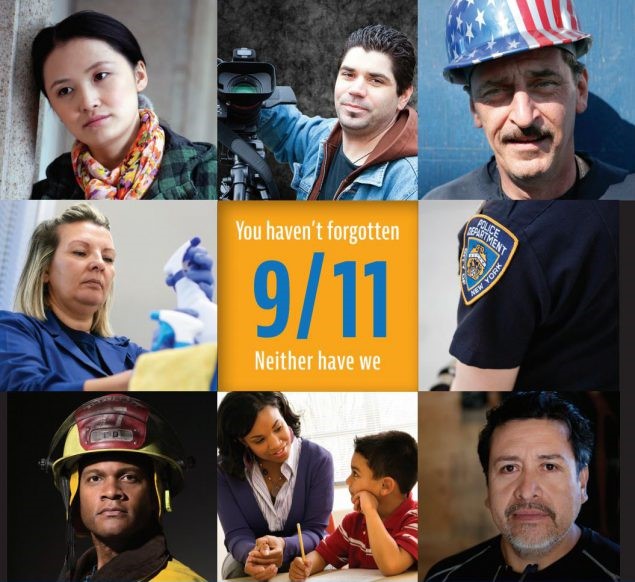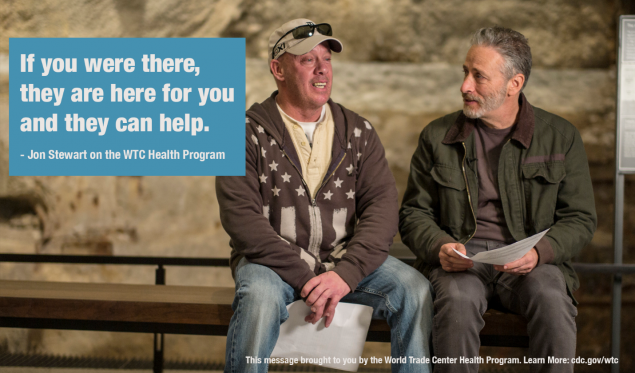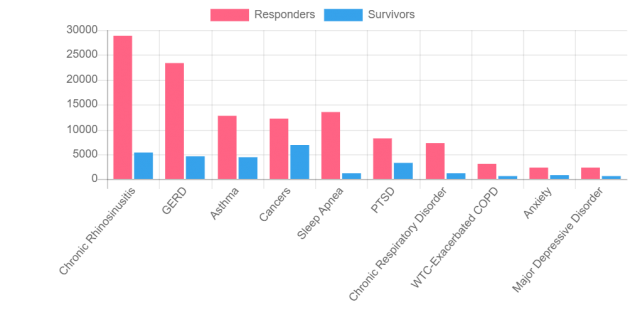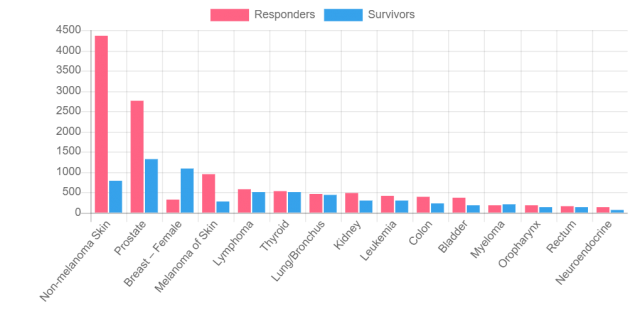CDC’s World Trade Center Health Program
Nearly two decades after the events of September 11, 2001, many survivors and first responders continue to experience health conditions as a result of their exposure to the hazardous environment. From the day of the event to present, CDC has played a vital role in helping to understand the health risks for those affected and continues to provide treatment and support research to this day.
The September 11, 2001 attacks exposed an estimated 500,000 people to toxic contaminants and emotionally stressful conditions. Common 9/11-related health conditions identified include chronic cough, asthma, sinus congestion, certain cancers, stress-related disorders, post-traumatic stress disorder, and depression. Shortly after the attacks, CDC and the National Institute for Occupational Safety and Health (NIOSH) provided funding to support a variety of post-disaster activities including medical evaluation, monitoring, and the establishment of the WTC Health Registry.

As a result of the combined efforts of researchers, physicians, responders, survivors, local government, research institutions, and others, the WTC Health Program was created by Congress with the passage of the James Zadroga 9/11 Health and Compensation Act of 2010 (Zadroga Act).
Timeline of Events from 2001 -Present
2001: Healthcare-related Activities at Clinics (pre-WTC Health Program)
2001-2002: Cooperative Agreement for the WTC Health Registry
2002: Contracts for one-time health screening of responders
2004: Cooperative agreements for repeat medical monitoring
2006: Cooperative agreements for treatment for responders
2008: Grant expanded treatment to survivors
2011: James Zadroga 9/11 Health and Compensation Act of 2010 is signed into Law, establishing the WTC Health Program and reactivating the September 11th Victim Compensation Fund
2015: Congress reauthorizes the WTC Health Program for 75 years (until 2090)
2019: Congress reauthorizes the September 11th Victim Compensation Fund until 2090

NIOSH Outreach image featuring president and founder of FealGood Foundation John Feal and comedian Jon Stewart. Image courtesy WTC Health Program.
The WTC Health Program officially launched in July 2011 and was originally authorized for five years. Congress reauthorized the program in 2015 and it is now funded through 2090. The WTC Health Program provides medical monitoring and treatment for certified WTC-related conditions for eligible responders at the World Trade Center and related sites, the Pentagon in Arlington, VA, and the crash site near Shanksville, PA, and eligible survivors who were in the NYC Disaster Area. The program provides expert care through seven Clinical Centers of Excellence in the NY metropolitan area and throughout the country in a Nationwide Provider Network.
The Zadroga Act also authorizes ongoing research activities, including the WTC Health Registry. The Research Compendium document describes the World Trade Center Research Program and the extraordinary contribution of researchers, responders, and survivors in providing research information necessary to ensure excellence in the clinical care for the population affected by the 9/11 attacks. It is a resource to assist the WTC Health Program staff with activities such as planning future research directions, assessing the impact of current studies, identifying gaps in the research, and coordinating external program reviews.
The mission of the WTC Health Program’s research is to advance the knowledge of physical and mental health conditions that may be related to the 9/11 terrorist attacks and improve diagnosis and treatment of WTC-related health conditions for which there has been diagnostic or treatment uncertainty.
WTC Health Program: Important Statistics
For more detailed information about overall membership in the WTC Health Program and the top conditions addressed by the program, please visit the program statistics web page.
Fast Facts (As of June 2020):
- There are 105,272 members enrolled in the World Trade Center Health Program:
- Responders: 79,001
- Survivors: 26,271

• Top 5 Certified Conditions:
1. Chronic Rhinosinusitis
2. Gastroesophageal Reflux Disease (GERD)
3. Asthma
4. Cancers
5. Sleep Apnea

• Top 5 certified cancers
1. Non-melanoma Skin
2. Prostate
3. Breast – Female
4. Melanoma of Skin
5. Lymphoma
Do you know someone who is a 9/11 survivor or responder? Encourage them to apply for membership in the WTC Health Program.
Stay up to date. Follow the WTC Health Program on Facebook and Twitter, or visit the website or Newsroom.
